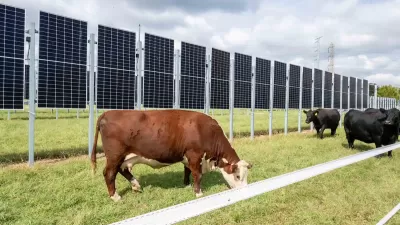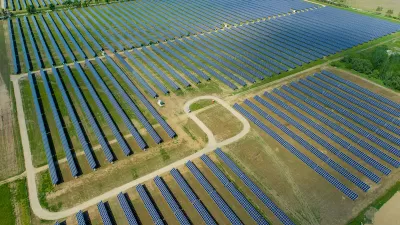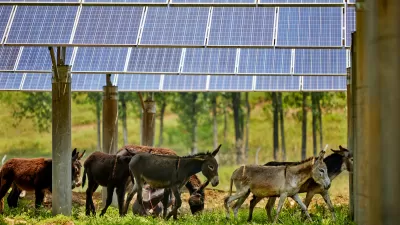Some of the nation's new clean energy capacity is being built on land that formerly grew crops. The sun, quite literally, is worth more than peanuts.
Joe Ryan reports: "Farmland has become fertile territory for clean energy, as solar and wind developers in North America, Europe and Asia seek more flat, treeless expanses to build. That’s also been a boon for struggling U.S. family farms that must contend with floundering commodity prices."
Along those latter lines, cotton process are down 71 percent in the last five years, soybeans 33 percent, and peanuts 16 percent. "Solar companies, meanwhile, are paying top dollar, offering annual rents of $300 to $700 an acre," reports Ryan, using statistics supplied by the NC Sustainable Energy Association.
The article focuses specifically on the new land use paradigms for solar power and farmland in southern states like North Carolina and Georgia. Ryan also discusses the financial and legal arrangements that make the new solar capacity on former farmland possible, along with the local opposition to such plans in many places around the country. One of the most infamous examples of local opposition to a proposal to convert farmland to solar power facility occurred last in 2015 in the North Carolina town of Woodland.
FULL STORY: Harvesting Sunshine More Lucrative Than Crops at Some U.S. Farms

Maui's Vacation Rental Debate Turns Ugly
Verbal attacks, misinformation campaigns and fistfights plague a high-stakes debate to convert thousands of vacation rentals into long-term housing.

Planetizen Federal Action Tracker
A weekly monitor of how Trump’s orders and actions are impacting planners and planning in America.

In Urban Planning, AI Prompting Could be the New Design Thinking
Creativity has long been key to great urban design. What if we see AI as our new creative partner?

King County Supportive Housing Program Offers Hope for Unhoused Residents
The county is taking a ‘Housing First’ approach that prioritizes getting people into housing, then offering wraparound supportive services.

Researchers Use AI to Get Clearer Picture of US Housing
Analysts are using artificial intelligence to supercharge their research by allowing them to comb through data faster. Though these AI tools can be error prone, they save time and housing researchers are optimistic about the future.

Making Shared Micromobility More Inclusive
Cities and shared mobility system operators can do more to include people with disabilities in planning and operations, per a new report.
Urban Design for Planners 1: Software Tools
This six-course series explores essential urban design concepts using open source software and equips planners with the tools they need to participate fully in the urban design process.
Planning for Universal Design
Learn the tools for implementing Universal Design in planning regulations.
planning NEXT
Appalachian Highlands Housing Partners
Mpact (founded as Rail~Volution)
City of Camden Redevelopment Agency
City of Astoria
City of Portland
City of Laramie





























